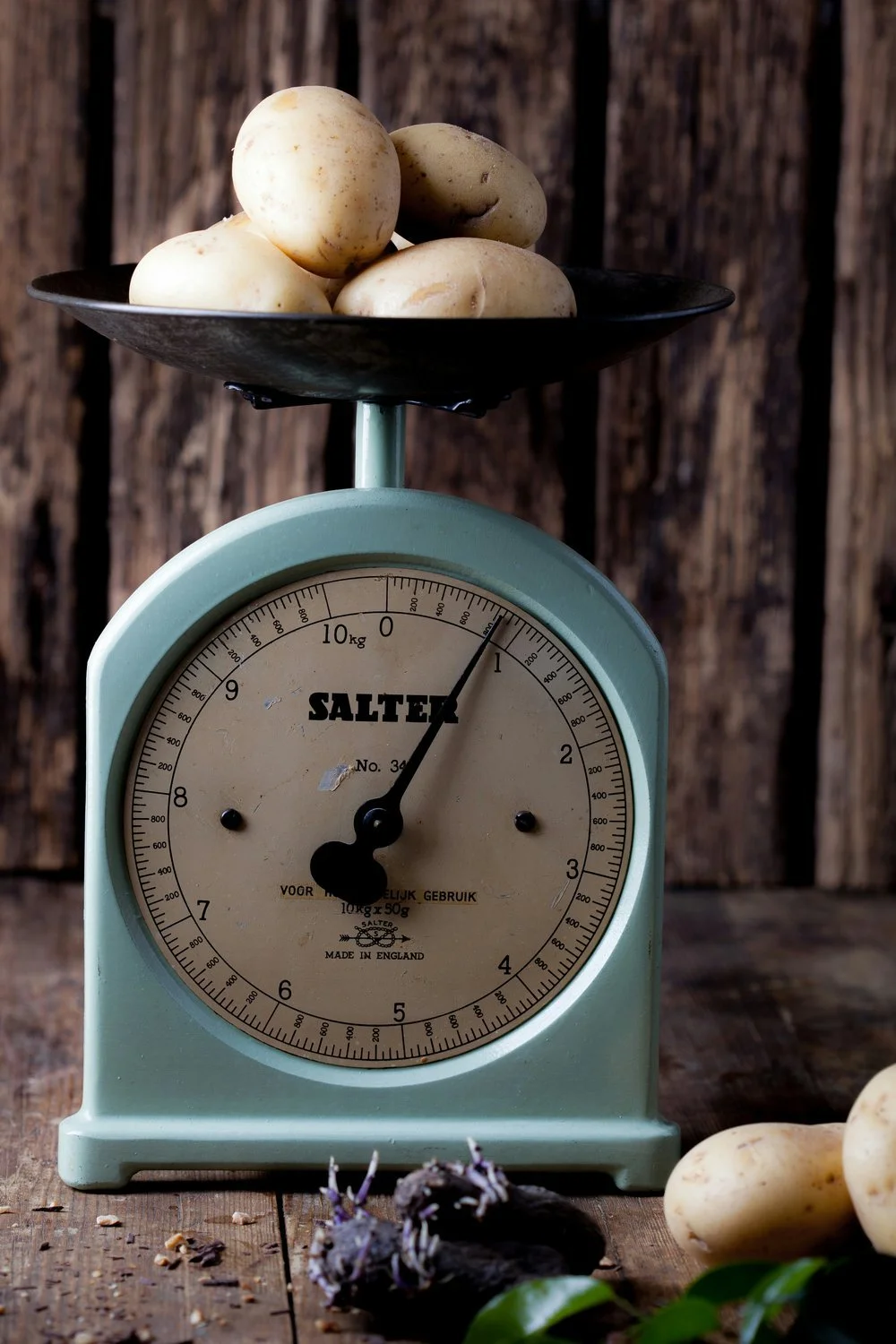This past week I’ve had a lot of clients bring up their scales. And it made me wonder, with household scales, whether for body weight or for weighing food, what are we really weighing? And how do the numbers on a scale potentially serve as fillers for something deeper that perhaps cannot be measured so easily?
When we’re out of touch with what we’re feeling, sometimes we unconsciously seek ways to express those feelings. And the scale could be one such way. Because a scale is concrete science, right? I had to look up the actual definition of weight, which reads: Weight is the measure of a body's relative mass or the quantity of matter contained by it, giving rise to a downward force; the heaviness of a person or thing. So we’re essentially measuring our own heaviness and what we contain.
I don’t know about you, but I use the word heavy to describe a mood sometimes, or even to describe the state of the world, or to express the impact of some piece of unsettling or unpleasant information - that’s really heavy, I might say. Could we be using the scale to measure how heavy we feel in relation to something, perhaps even something intangible or so far, unknowable? And if the number on the scale goes down, it often lightens our mood too, right? We’re both objectively and subjectively “lighter”.
What about measuring what we contain? What if we could measure or quantify our emotions: Our anger, our sadness, our pain, our loneliness, on a scale, making it visible, and tangible? Could that be partially what we’re attempting when we weight ourselves? It can be terribly disappointing to see what we contain - all of our doubts and fears and aggression and destructiveness and narcissism - all normal human traits that tend to bring us shame and guilt, that we are generally pretty careful to keep at bay and hidden from public view, sometimes hidden from our own view. And sometimes we say, “the scale doesn’t lie” and maybe that’s the inherent dilemma of the scale: It captures our “heaviness” even when we try to hide it from view.
On a practical level, the scale is also measuring what we’ve taken in - food scales can capture and regulate how much we take in to ourselves. And the body weight scale captures the aftermath: What we’ve allowed in or haven’t allowed it. And if we’re trying to keep something, or someone, out, out of fear of being hurt, being vulnerable, being overwhelmed, being intruded upon - then it makes good, logical sense we might attempt to regulate that and then try to see how well we’ve done. This is one reason why I do not necessarily encourage clients to get rid of their scales right away - they are often serving a psychically important purpose, serving as a reliable safety mechanism of sorts. And ripping off a bandaid is good way to leave a gaping wound before it has had sufficient time to heal and time to explore alternative ways to protect oneself.
When we are looking at a body weight scale, I sometimes wonder if it matters what the client is actually measuring. For instance, if we cut our hair or even use the restroom before weighing, that number would go down. So it’s not necessarily always about measuring fat loss - which is what clients typically report wanting to lose in the name of health and wellbeing. Gaining or losing fat weight cannot happen in a matter of hours or days. So any number that changes on a scale that quickly is not measuring fat. More frequently the scale is measuring water fluctuations. And the water content of our bodies is constantly shifting - relative to how hydrated we are, relative to how much water we’re storing in our cells and in our muscles at any given moment, relative to how our bodies respond to being awake or asleep for extended periods of time - but the number is not reflecting fat gain or loss.
Water is stored in the muscles and in the liver alongside something called glycogen, which is the storage molecule for glucose, or energy. So when we have glycogen on hand for quick energy needs - which is a good thing from a biological perspective - we automatically store more water too. So relying on the number on the scale to indicate fat can actually backfire and make people think they need to restrict more, which can cause that number to fluctuate even more with increased dehydration and lack of glycogen stores, perpetuating the myth that fat is being lost. A good dietitian can help discern the difference and explain what is actually happening in the body when we see numbers shifting on a scale. Trying to interpret this alone can be a recipe for a going down a rabbit hole that can be difficult to climb out of solo.
Essentially what I am suggesting is that the pursuit of weight loss according to a scale is the surface layer of a much more complex, emotional pursuit. When clients come with the wish for weight loss, often we will address the short- and long-term risks, rewards, and consequences of these pursuits We all know weight can be lost through a variety of avenues these days - that is generally not in question. But what can also be examined are the longings, wishes and desires behind this pursuit, as well as some basic biologic education that can ultimately help us understand how we might be helping or hurting ourselves in the name of health.

